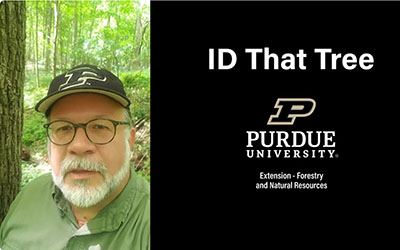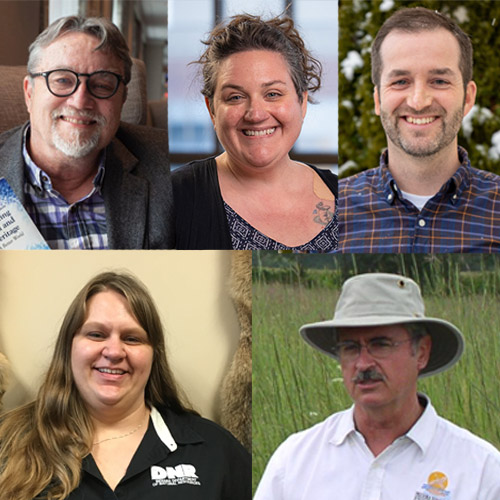Zollner Named University Faculty Scholar
 recognizes outstanding faculty who are on an accelerated path for academic distinction in the discovery and dissemination of knowledge. Of more than 3,500 faculty members at Purdue, only 120 receive this distinction.
recognizes outstanding faculty who are on an accelerated path for academic distinction in the discovery and dissemination of knowledge. Of more than 3,500 faculty members at Purdue, only 120 receive this distinction.
"I greatly appreciate this award and want to emphasize that this recognition is a function of the wonderful opportunities I have in FNR; to work with supportive colleagues, to collaborate with spectacular partners from tribal, federal, state and NGO agencies, and to mentor astounding undergraduate and graduate students as well as post docs in developing their own research," Zollner said. "Success really is a team effort and I value this award most for how it will help develop more such opportunities moving forward."
Zollner joined the Purdue Forestry and Natural Resources faculty in 2006 as an assistant professor of quantitative ecology. He was promoted to associate professor in 2010 and to full professor in 2018. Zollner earned his bachelor's in natural resources from the University of Michigan (1989), his master's in wildlife ecology from Mississippi State University (1993) and his doctorate in ecology from Indiana State University (1998). He then worked for six years as a research ecologist at the USDA Forest Service North Central Research Station in Rhinelander, Wisconsin, before coming to West Lafayette.
The University Faculty Scholar award is just the most recent accolade for Zollner. In 2017, he was selected for the Innovative Teaching Award from the Board on Agriculture Assembly's Academic Programs Section of the Association of Public Land-Grant Universities in 2017. Within FNR, he also has received the Outstanding Teaching Award (2011), the William L Hoover Exemplary Faculty Service Award (2014) and the Outstanding Undergraduate Counselor Award (2015, 2016, 2017).
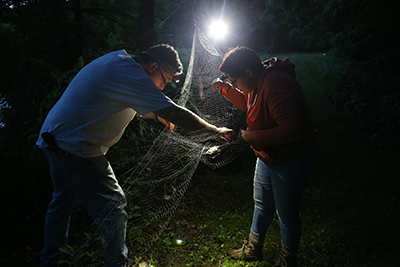 "Dr. Zollner has excelled as a researcher and educator during his tenure at Purdue," FNR department head Dr. Bob Wagner said. "He represents everything that we seek in our Purdue University Faculty Scholars. He is a globally recognized leader in integrating behavioral ecology and landscape ecology. His leadership in this field has been demonstrated by both a field-defining paper published in TREE in 1996 which that has been cited more than 1,000 times according to Google Scholar, and by a paper published in Science on how modeling approaches can improve forecasts on the impacts of climate change. His research innovatively combines field experiments and simulation models to improve scientific understanding of how changes in landscape composition and structure caused by resource management and land-use practices affect wildlife species of conservation concern."
"Dr. Zollner has excelled as a researcher and educator during his tenure at Purdue," FNR department head Dr. Bob Wagner said. "He represents everything that we seek in our Purdue University Faculty Scholars. He is a globally recognized leader in integrating behavioral ecology and landscape ecology. His leadership in this field has been demonstrated by both a field-defining paper published in TREE in 1996 which that has been cited more than 1,000 times according to Google Scholar, and by a paper published in Science on how modeling approaches can improve forecasts on the impacts of climate change. His research innovatively combines field experiments and simulation models to improve scientific understanding of how changes in landscape composition and structure caused by resource management and land-use practices affect wildlife species of conservation concern."
Zollner teaches five courses - Ecology and Systematics of Mammal and Birds (FNR 25150), Vertebrate Population Dynamics (FNR 44700), Optimize Conference Attendance (FNR 46700), Advanced Mammalogy (FNR 56700) and Individual-based Ecology and Modeling (FNR 69300), impacting approximately 160 students annually. He also plays a vital role in the wildlife segment of the annual FNR Summer Practicum (FNR 37300), teaching small mammal tracking and trapping and also radio telemetry.
Zollner has mentored more than 50 undergraduate researchers, with 12 earning credit as authors on peer-reviewed scientific articles, and guided 11 master's students and seven PhD students to degree completion. He also has championed diversity and supported Native American scholars through the Sloan Foundation Indigenous Graduate Partnership, including current PhD student Cami Griffith and recent master's alumna Nerisa Taua.
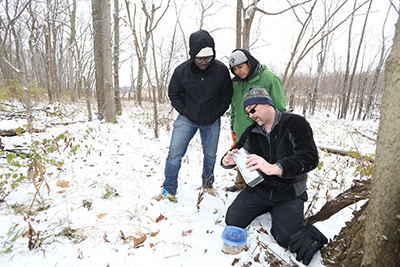 Zollner's research interests focus on understanding the interactions between animal behavior and landscape-level habitat changes, specifically as a result of human activity. His work has helped explain the rules that animals use to navigate across landscapes. He also has developed and applied individual-based models for wildlife conservation, which can be used to predict wildlife responses to landscape changes. Although mostly centered on mammalian modeling systems with species like American marten, river otters and bats, Zollner also has worked with birds and herps.
Zollner's research interests focus on understanding the interactions between animal behavior and landscape-level habitat changes, specifically as a result of human activity. His work has helped explain the rules that animals use to navigate across landscapes. He also has developed and applied individual-based models for wildlife conservation, which can be used to predict wildlife responses to landscape changes. Although mostly centered on mammalian modeling systems with species like American marten, river otters and bats, Zollner also has worked with birds and herps.
His current research grants include:
- "Influence of Human Activity Upon Wildlife Behavior and Demography," a McIntire-Stennis supported project, which studies the effects of a wide range of human disturbances, including urban development, climate change and outdoor recreation, on wildlife abundance, survival, reproductive success, feeding behaviors and dispersal patterns. The field data regarding individual species and habitats is input into existing computer modeling tools that have the ability to simulate scenarios and predict future impacts on a large scale, which would take several years and multiple empirical studies to achieve. The outcomes of this project will provide tools for understanding how a wide variety of species are impacted by very specific scenarios of habitat change and what can be done to mitigate the negative effects. This includes conservation of existing lands, restoration of habitat and modifying human activity to accommodate wildlife.
- Black Vulture Ecology and Human-Wildlife Conflicts. This project, sponsored primarily by USDA APHIS Wildlife Services (WS) National Wildlife Research Center and through an AgSEED grant, focuses on understanding vulture ecology and the dynamics of the conflict between livestock producers and vultures, in order to identify effective and defensible pathways to protect both livestock and birds.
- "Mitigating the Spread of Chronic Wasting Disease through an Ecological Trap." This project, sponsored by the Indiana Department of Natural Resources, simulates the effectiveness of ecological traps at mitigating the spread of chronic wasting disease into Indiana's white-tailed deer population.
- Agent-Based Modeling to Improve Cage-Free Housing Systems: What Does the Hen See? This research, sponsored by the National Institute of Food and Agriculture, will see Zollner work with colleagues in Purdue Animal Sciences, led by Dr. Darrin Karcher, to assess how hens see their environment so that new cage-free housing can be created that positively impacts hen behavior, productivity and welfare and food safety. After gathering data on hens' eyes, physiology, behavior and welfare in two different cage-free systems, models will be developed to estimate how hens see their environment and agent-based models will be created in order to test virtual cage-free housing systems.
- "Alternative Management Strategies to Address Multiple Interacting Stressors on Least Bell's Vireo Populations." This research, sponsored by the Army Engineer Research and Development Center, aims to develop tools and approaches for the recovery of the federally endangered Least Bell's Vireo (vireo bellii pusillus). Researchers will develop a spatially-explicit agent-based model to understand the effects of individual and interacting threats and stressors on the species population and develop alternative management strategies to address them.
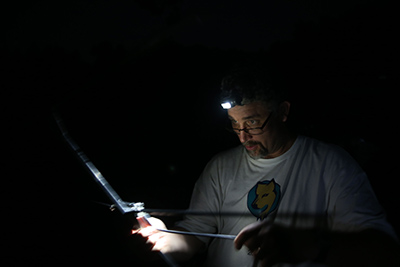 Zollner's recent publications exemplify the diverse range species he has studied, including coyotes, bobcats, river otters, flying squirrels and bats.
Zollner's recent publications exemplify the diverse range species he has studied, including coyotes, bobcats, river otters, flying squirrels and bats.
His work also has covered the topics of the influence of animal movement interactions on sociality, individual based modeling, and, working with Dr. Elizabeth Flaherty, mentored conferences' impact on student career exploration and professional development among other research areas.
Professionally, Zollner serves a variety of national committees and organizations. He is a member of the American Society of Mammologists, currently acting as the associate editor of the Journal of Mammalogy. He served as the mammalian nongame technical advisory committee chair for the Indiana Department of Natural Resources. He is a member of the International Society for Ecological Modeling, the North American Chapter of the International Association for Landscape Ecology, and The Wildlife Society. Within FNR, Zollner serves on the Awards Committee and the Safety Committee, while also representing the department on the College of Agriculture Honors Committee and acting as the College's Representative for the Honors College.
Past and Current FNR University Faculty Scholars
2020: Zhao Ma
2019: Jason Hoverman
2018: Songlin Fei
2017: Tomas Hook
2016: Linda Prokopy
2015: Marisol Sepulveda* (Showalter Faculty Scholar)
2013: Bryan Pijanowski
2012: Jeff Dukes
2011: Doug Jacobs
2008 – Andrew DeWoody
2003 – Rob Swihart




